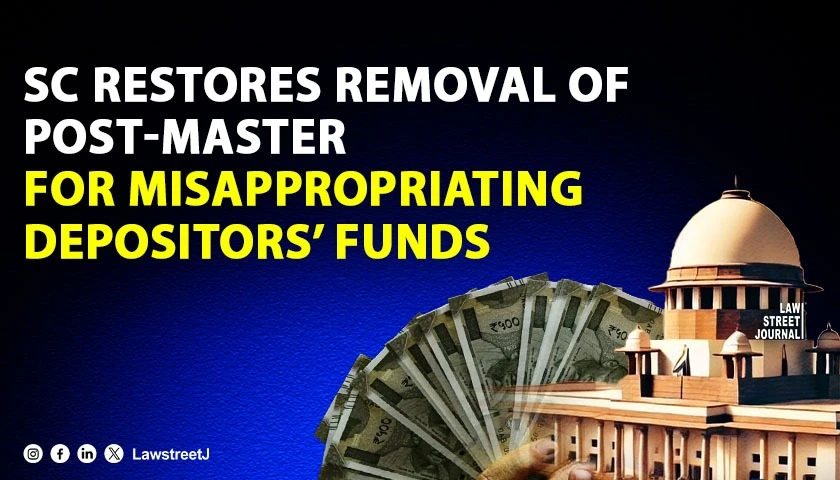New Delhi: The Supreme Court has set aside the order of the Rajasthan High Court which had directed reinstatement of a Branch Post-Master removed from service for misappropriation of depositors’ funds. Allowing the appeal filed by the Union of India, the Court restored the removal order, holding that the charge of misappropriation stood proved and that the High Court erred in interfering with the findings of the departmental authority.
The judgment, delivered on November 13, 2025, notes that during an inspection conducted on June 16, 2011, it was discovered that the respondent, working as Branch Post-Master, had accepted deposits from account holders, made entries in their passbooks, but failed to record the same in the official registers. He was found to have misappropriated an amount of ₹5,266. The Court recorded that during the inquiry, the respondent admitted the misconduct, stating in his written statement that he had deposited the amount later.
Referring to the nature of duties performed by a Branch Post-Master, the Bench observed:
“Relationship of a customer with a banker is of mutual trust. Any account holder will be satisfied once an entry is made in his passbook regarding deposit of any amount.”
The Court emphasised that entries made by postal employees in passbooks create legitimate reliance for depositors, and any discrepancy between those entries and official records amounts to a serious breach of trust. On this aspect, the judgment states:
“Mere deposit of the embezzled amount will not absolve an employee of the misconduct.”
The Court reiterated that repayment of the misappropriated amount at a later stage does not mitigate the misconduct when the employee has admitted to diverting public money for personal use.
The respondent had argued before the authorities that the lapse occurred due to “ignorance of the Rules,” an explanation the Supreme Court found untenable. The judgment notes:
“Ignorance of the Rules cannot be a valid defence in a case of proven misappropriation, particularly when the respondent had more than 12 years of service and was fully aware of the statutory responsibilities attached to the post.”
The Supreme Court held that the High Court erred in reappreciating the evidence and substituting its own conclusions in place of the disciplinary authority, when the inquiry had been conducted properly, the charges were proved, and no procedural irregularity had been shown. The Bench recalled the well-settled principle that judicial review does not extend to re-evaluating the sufficiency or adequacy of evidence in departmental inquiries unless the findings are perverse or unsupported by material.
The Court stated:
“The High Court transgressed the limits of judicial review by revisiting the merits of the factual findings when no infirmity in the inquiry process was demonstrated.”
The Bench further observed that the position held by the respondent involves the handling of public funds and therefore demands strict adherence to rules and integrity. Any deviation that impacts depositors’ trust must be treated with seriousness. The Court held that reinstatement was wholly unjustified given the nature of the misconduct and the admitted diversion of funds.
Finding that the High Court’s order was legally unsustainable, the Supreme Court allowed the appeal, setting aside the reinstatement and restoring the penalty of removal from service.
Case Title: Union of India & Ors. v. Indraj
Court: Supreme Court of India
Bench: Hon’ble Justice Rajesh Bindal and Hon’ble Justice Manmohan
Date of Judgment: November 13, 2025
For Petitioner(s): Mr. Brijender Chahar, A.S.G.; Mr. Karan Chahar, Adv.; Mr. Piyush Beriwal, Adv.; Mr. Pallav Mongia, Adv.; Mr. Dhruv Sharma, Adv.; Mr. Amrish Kumar, AOR
For Respondent(s): Mr. Rajesh Kumar, AOR; Mr. Dhiraj Kumar Sammi, Adv.; Mr. Krishan Kant Kumar, Adv.











